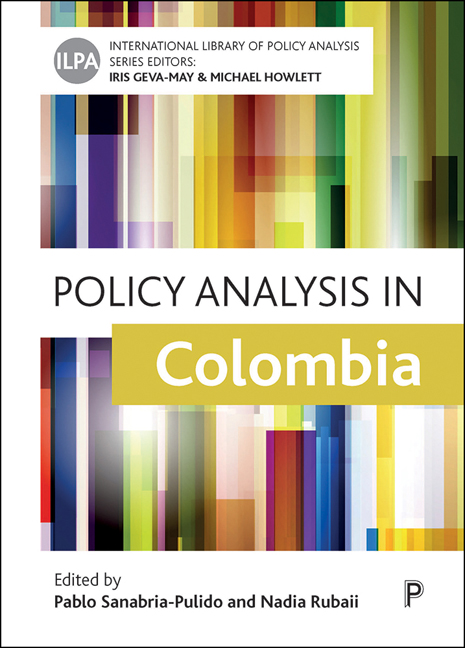Book contents
- Frontmatter
- Dedication
- Contents
- List of Figures and Tables
- List of Abbreviations
- Notes on Contributors
- Editors’ Introduction to the Series
- Policy Analysis in Colombia: An Introduction
- Part One Policy Analysis in Contemporary Colombia
- One The policy Analysis Movement in Colombia: The State of the Art
- Two Evolution of Policy Analysis as a Field of Study and Instruction in Colombia
- Three Policy Analysis, Bureaucratic Capacity and Public Administration Reforms in Colombia
- Part Two Policy Analysis within National and Subnational Governments
- Four Policy Analysis Inside Central Government in Colombia
- Five Policy Analysis and the Legislature in Colombia
- Six Policy Analysis in the Colombian Constitutional Court
- Seven Metropolitan Governance and Policy Analysis in Colombia
- Eight Policy Analysis for Decision Making in Colombian Local Governments
- Part Three Policy Analysis in Key Policy Domains
- Nine Policy Analysis in the Education Sector in Colombia
- Ten Policy Analysis in the Health Sector in Colombia
- Eleven Policy Analysis and Decision Making in the Military Forces: The Havana Experience
- Twelve Technocracy, Decision Making and Economic Policy in Colombia
- Thirteen Social Policy, Target Populations and Policy Analysis in Colombia
- Part Four Policy Analysis Beyond the State
- Fourteen Political Parties and Policy Analysis in Colombia
- Fifteen Policy Analysis and NGOs in Colombia
- Sixteen Media, Evidence and Policy Analysis in Colombia
- Conclusion: Building Capacity for Policy Analysis Amid Tensions and Challenges in Colombia
- Index
Policy Analysis in Colombia: An Introduction
Published online by Cambridge University Press: 10 March 2021
- Frontmatter
- Dedication
- Contents
- List of Figures and Tables
- List of Abbreviations
- Notes on Contributors
- Editors’ Introduction to the Series
- Policy Analysis in Colombia: An Introduction
- Part One Policy Analysis in Contemporary Colombia
- One The policy Analysis Movement in Colombia: The State of the Art
- Two Evolution of Policy Analysis as a Field of Study and Instruction in Colombia
- Three Policy Analysis, Bureaucratic Capacity and Public Administration Reforms in Colombia
- Part Two Policy Analysis within National and Subnational Governments
- Four Policy Analysis Inside Central Government in Colombia
- Five Policy Analysis and the Legislature in Colombia
- Six Policy Analysis in the Colombian Constitutional Court
- Seven Metropolitan Governance and Policy Analysis in Colombia
- Eight Policy Analysis for Decision Making in Colombian Local Governments
- Part Three Policy Analysis in Key Policy Domains
- Nine Policy Analysis in the Education Sector in Colombia
- Ten Policy Analysis in the Health Sector in Colombia
- Eleven Policy Analysis and Decision Making in the Military Forces: The Havana Experience
- Twelve Technocracy, Decision Making and Economic Policy in Colombia
- Thirteen Social Policy, Target Populations and Policy Analysis in Colombia
- Part Four Policy Analysis Beyond the State
- Fourteen Political Parties and Policy Analysis in Colombia
- Fifteen Policy Analysis and NGOs in Colombia
- Sixteen Media, Evidence and Policy Analysis in Colombia
- Conclusion: Building Capacity for Policy Analysis Amid Tensions and Challenges in Colombia
- Index
Summary
This book represents the first comprehensive examination of policy analysis in Colombia, and it does so at a critical juncture in the country's history when having government officials capable of making evidence-based policy decisions – and having nongovernmental actors in universities, the media, civil society and political parties supporting that – is as important as ever. This volume includes a diverse array of chapters that describe and critically evaluate the role of different levels of government, institutions of government, and actors outside of government in the development, implementation and evaluation of public policy, with attention to the extent to which they engage systematically in policy analysis. The book also highlights the degree to which analysis informs key substantive policy areas, and how Colombian higher education institutions are teaching public policy and have policy analysis as a field of study.
It will be apparent to the reader of the book or any individual chapter that public policy and policy analysis are relatively new academic fields and professional career options in Colombia, and the systematic application of policy analysis to government decision making also is a relatively new phenomenon. That said, there are a number of notable examples throughout this book of how governmental and nongovernmental institutions and actors have historically contributed to analysis of policy options and outcomes. We highlight those examples throughout the book. Colombia, as a country, exemplifies a particular path of development whereby, even with the presence of key institutional challenges, the country has been able to configure a relatively developed public administration apparatus.
A primer on the Colombian context
The Republic of Colombia is structured as a constitutional, multiparty democracy per the terms of the Constitution adopted in 1991. It is a unitary, decentralized republic in which the national government includes executive, legislative and judicial branches. Although the Constitution prescribes a system of separation of powers and checks and balances, extensive policy-making powers are vested in the President and, by extension, executive branch agencies. The capacities and inclinations of each branch of the Colombian government to engage in policy analysis are discussed within individual chapters within this volume.
- Type
- Chapter
- Information
- Policy Analysis in Colombia , pp. 1 - 8Publisher: Bristol University PressPrint publication year: 2020



